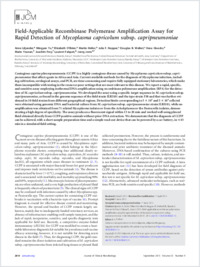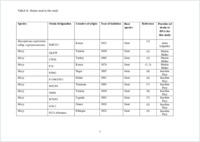Field-applicable recombinase polymerase amplification assay for rapid detection of Mycoplasma capricolum subsp. capripneumoniae
- Liljander, Anne International Livestock Research Institute, Nairobi, Kenya
- Yu, Mingyan International Livestock Research Institute, Nairobi, Kenya
- O'Brien, Elizabeth International Livestock Research Institute, Nairobi, Kenya
- Heller, Martin Friedrich-Loeffler-Institut, Federal Research Institute for Animal Health, Jena, Germany
- Nepper, Julia F. Department of Biochemistry, University of Wisconsin, Madison, USA
- Weibel, Douglas B. Department of Biochemistry, University of Wisconsin, Madison, USA
- Gluecks, Ilona Vétérinaires Sans Frontières Suisse, Nairobi, Kenya
- Younan, Mario Vétérinaires Sans Frontières Germany, Nairobi, Kenya
- Frey, Joachim Institute of Veterinary Bacteriology, University of Bern, Switzerland
- Falquet, Laurent Biochemistry Unit, University of Fribourg and Swiss Institute of Bioinformatics, Fribourg, Switzerland
- Jores, Joerg International Livestock Research Institute, Nairobi, Kenya - Institute of Veterinary Bacteriology, University of Bern, Switzerland
-
09.01.2015
Published in:
- Journal of Clinical Microbiology. - 2016, vol. 53, no. 9, p. 2810–2815
English
Contagious caprine pleuropneumonia (CCPP) is a highly contagious disease caused by Mycoplasma capricolum subsp. capripneumoniae that affects goats in Africa and Asia. Current available methods for the diagnosis of Mycoplasma infection, including cultivation, serological assays, and PCR, are time-consuming and require fully equipped stationary laboratories, which make them incompatible with testing in the resource-poor settings that are most relevant to this disease. We report a rapid, specific, and sensitive assay employing isothermal DNA amplification using recombinase polymerase amplification (RPA) for the detection of M. capricolum subsp. capripneumoniae. We developed the assay using a specific target sequence in M. capricolum subsp. capripneumoniae, as found in the genome sequence of the field strain ILRI181 and the type strain F38 and that was further evidenced in 10 field strains from different geographical regions. Detection limits corresponding to 5 × 103 and 5 × 104 cells/ml were obtained using genomic DNA and bacterial culture from M. capricolum subsp. capripneumoniae strain ILRI181, while no amplification was obtained from 71 related Mycoplasma isolates or from the Acholeplasma or the Pasteurella isolates, demonstrating a high degree of specificity. The assay produces a fluorescent signal within 15 to 20 min and worked well using pleural fluid obtained directly from CCPP-positive animals without prior DNA extraction. We demonstrate that the diagnosis of CCPP can be achieved, with a short sample preparation time and a simple read-out device that can be powered by a car battery, in < 45 min in a simulated field setting.
- Faculty
- Faculté des sciences et de médecine
- Department
- Département de Biologie
- Language
-
- English
- Classification
- Biological sciences
- License
- License undefined
- Identifiers
-
- RERO DOC 258294
- DOI 10.1128/JCM.00623-15
- Persistent URL
- https://folia.unifr.ch/unifr/documents/304746
Other files
Statistics
Document views: 59
File downloads:
- fal_far.pdf: 166
- fal_far_sm.pdf: 104

